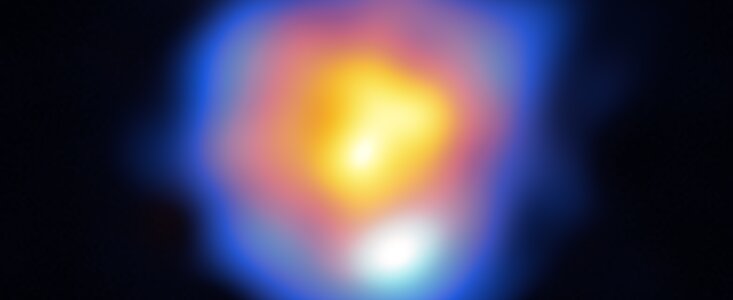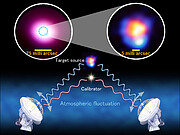Mededeling
ALMA bereikt waarnemingen met hoogste resolutie tot nu toe
15 november 2023
De Atacama Large Millimeter/submillimeter Array (ALMA), waarin ESO partner is, heeft geobserveerd met de hoogste resolutie sinds de ingebruikname. Tijdens een technische test bracht een team van experts van het Joint ALMA Observatory (JAO), het National Astronomical Observatory of Japan (NAOJ), het National Radio Astronomy Observatory (NRAO) in de VS en ESO een ster in de laatste fasen van zijn ontwikkeling in beeld met een resolutie van 5 milliboogseconden. Dit toont aan dat ALMA door astronomen kan worden gebruikt om objecten te observeren met een detail dat vergelijkbaar is met het vanaf de aarde zien van een 10 meter lange bus op de maan.
ALMA bestaat uit 66 antennes die op verschillende plaatsen op het hooggelegen Chajnantor-plateau in Chili kunnen worden neergezet. Elke antenne is uitgerust met ontvangers waarmee radiogolven in verschillende frequentiebereiken, of banden, kunnen worden waargenomen. De resolutie van ALMA verbetert als de maximale afstand tussen de antennes groter wordt en als de frequentie van de waarnemingen stijgt. De nieuwe beelden zijn verkregen met de voor ALMA meest uitgestrekte configuratie, met een maximale afstand tussen de antennes van 16 kilometer. Ze zijn gemaakt met de Band 10-ontvangers, waarmee ALMA kan waarnemen bij frequenties tot 950 GHz, de hoogst mogelijke frequentie voor de array.
Omdat de waarnemingen de grens van ALMA's mogelijkheden tarten, was het een enorme uitdaging om ze uit te voeren. De Band 10-ontvangers zijn al sinds 2014 beschikbaar op ALMA, maar de astronomen moesten wachten op de validatie van een nieuwe kalibratietechniek, die band-tot-band wordt genoemd, om de nieuwe waarnemingen te kunnen verrichten. Dat deden ze tijdens een technische test in 2021. Toen observeerden ze een geëvolueerde melkwegster, R Leporis, met behulp van een heldere galactische kern als kalibrator. Die kern bevindt zich weliswaar ver weg, maar lijkt voor ons dichtbij R Leporis aan de hemel te staan. De resultaten worden vandaag gepubliceerd in de Astrophysical Journal.
Dit resultaat kwam tot stand met veel inzet van ESO-medewerkers. Zij waren betrokken bij de testwaarnemingen, bij de eerdere experimenten in de aanloop naar dit technische eindresultaat en bij de ontwikkeling van de nieuwe kalibratietechniek.
Meer informatie
Dit resultaat is gepubliceerd in een artikel getiteld "ALMA High-frequency Long Baseline Campaign in 2021: Highest Angular Resolution Submillimeter Wave Images for the Carbon-rich Star R Lep" dat verschijnt in de Astrophysical Journal (doi:10.3847/1538-4357/acf619).
Het team bestaat uit Y. Asaki (JAO; NAOJ; SOKENDAI), L. Maud (ESO; Universiteit Leiden), H. Francke (JAO), H. Nagai (NAOJ), D. Petry (ESO), E.B. Fomalont (NRAO), E. Humphreys (JAO; ESO), A.M. S. Richards (Universiteit van Manchester), K.T. Wong (IRAM; Universiteit van Uppsala), W. Dent (JAO), A. Hirota (JAO; NAOJ), J.M. Fernandez (Lowell Observatory), S. Takahashi (NAOJ), en A.S. Hales (JAO; NRAO).
Een eerdere technische studie, die tot de 2021 Campagne heeft geleid, is te vinden in: "ALMA High-frequency Long-baseline Campaign in 2019: Band 9 and 10 In-band and Band-to-band Observations Using ALMA's Longest Baselines", gepubliceerd in de Astrophysical Journal in augustus 2023 (doi: 10.3847/1538-4365/acd6f1).
ALMA is een samenwerkingsverband van ESO (als vertegenwoordiger van haar lidstaten), NSF (VS) en NINS (Japan), samen met NRC (Canada), NSTC en ASIAA (Taiwan), en KASI (Republiek Korea), in samenwerking met de Republiek Chili. Het gezamenlijke ALMA-observatorium wordt beheerd door ESO, AUI/NRAO en NAOJ.
Links
Contact
Luke Maud
ALMA Regional Centre bij ESO
Garching bei München, Duitsland
Tel: +49 89 3200 6765
Email: Luke.Maud@eso.org
Bárbara Ferreira
ESO Media Manager
Garching bei München, Duitsland
Tel: +49 89 3200 6670
Email: press@eso.org
Over de Mededeling
| Id: | ann23019 |
Our use of Cookies
We use cookies that are essential for accessing our websites and using our services. We also use cookies to analyse, measure and improve our websites’ performance, to enable content sharing via social media and to display media content hosted on third-party platforms.
ESO Cookies Policy
The European Organisation for Astronomical Research in the Southern Hemisphere (ESO) is the pre-eminent intergovernmental science and technology organisation in astronomy. It carries out an ambitious programme focused on the design, construction and operation of powerful ground-based observing facilities for astronomy.
This Cookies Policy is intended to provide clarity by outlining the cookies used on the ESO public websites, their functions, the options you have for controlling them, and the ways you can contact us for additional details.
What are cookies?
Cookies are small pieces of data stored on your device by websites you visit. They serve various purposes, such as remembering login credentials and preferences and enhance your browsing experience.
Categories of cookies we use
Essential cookies (always active): These cookies are strictly necessary for the proper functioning of our website. Without these cookies, the website cannot operate correctly, and certain services, such as logging in or accessing secure areas, may not be available; because they are essential for the website’s operation, they cannot be disabled.
Functional Cookies: These cookies enhance your browsing experience by enabling additional features and personalization, such as remembering your preferences and settings. While not strictly necessary for the website to function, they improve usability and convenience; these cookies are only placed if you provide your consent.
Analytics cookies: These cookies collect information about how visitors interact with our website, such as which pages are visited most often and how users navigate the site. This data helps us improve website performance, optimize content, and enhance the user experience; these cookies are only placed if you provide your consent. We use the following analytics cookies.
Matomo Cookies:
This website uses Matomo (formerly Piwik), an open source software which enables the statistical analysis of website visits. Matomo uses cookies (text files) which are saved on your computer and which allow us to analyze how you use our website. The website user information generated by the cookies will only be saved on the servers of our IT Department. We use this information to analyze www.eso.org visits and to prepare reports on website activities. These data will not be disclosed to third parties.
On behalf of ESO, Matomo will use this information for the purpose of evaluating your use of the website, compiling reports on website activity and providing other services relating to website activity and internet usage.
Matomo cookies settings:
Additional Third-party cookies on ESO websites: some of our pages display content from external providers, e.g. YouTube.
Such third-party services are outside of ESO control and may, at any time, change their terms of service, use of cookies, etc.
YouTube: Some videos on the ESO website are embedded from ESO’s official YouTube channel. We have enabled YouTube’s privacy-enhanced mode, meaning that no cookies are set unless the user actively clicks on the video to play it. Additionally, in this mode, YouTube does not store any personally identifiable cookie data for embedded video playbacks. For more details, please refer to YouTube’s embedding videos information page.
Cookies can also be classified based on the following elements.
Regarding the domain, there are:
- First-party cookies, set by the website you are currently visiting. They are stored by the same domain that you are browsing and are used to enhance your experience on that site;
- Third-party cookies, set by a domain other than the one you are currently visiting.
As for their duration, cookies can be:
- Browser-session cookies, which are deleted when the user closes the browser;
- Stored cookies, which stay on the user's device for a predetermined period of time.
How to manage cookies
Cookie settings: You can modify your cookie choices for the ESO webpages at any time by clicking on the link Cookie settings at the bottom of any page.
In your browser: If you wish to delete cookies or instruct your browser to delete or block cookies by default, please visit the help pages of your browser:
Please be aware that if you delete or decline cookies, certain functionalities of our website may be not be available and your browsing experience may be affected.
You can set most browsers to prevent any cookies being placed on your device, but you may then have to manually adjust some preferences every time you visit a site/page. And some services and functionalities may not work properly at all (e.g. profile logging-in, shop check out).
Updates to the ESO Cookies Policy
The ESO Cookies Policy may be subject to future updates, which will be made available on this page.
Additional information
For any queries related to cookies, please contact: pdprATesoDOTorg.
As ESO public webpages are managed by our Department of Communication, your questions will be dealt with the support of the said Department.


